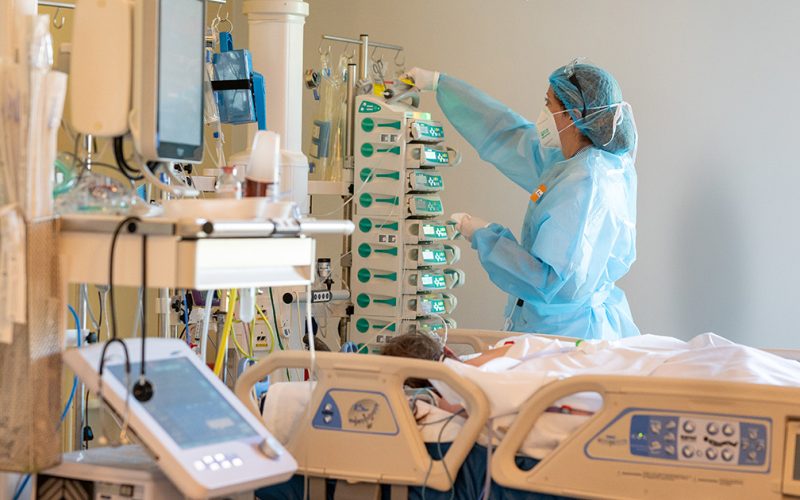In previous virus outbreaks, the search for effective medication often only started when the epidemic was over. Partly thanks to the REMAP-CAP research, this is now earlier possible. How far-sightedness after the Mexican flu in 2009 made it possible to start testing medicines for COVID-19 shortly after the outbreak. “If things go well, we will learn how to treat patients during the pandemic.”
With the coronavirus outbreak, the fear of many medical scientists came to life: a new infectious virus that is making people sick worldwide. With COVID-19, a lung infection against which a vaccine does not yet exist and for which we do not (yet) know how to treat this with medicines. Since it will take some time before a vaccine against the virus will become available, it would be nice if we quickly find medicines that allow us to effectively treat COVID-19 patients. However, as the past has taught, during epidemics research for a therapy often starts slow. In fact, it usually only happens when the epidemic is more or less over. We saw this with SARS in China and Hong Kong (2002-2003), at the German EHEC E. coli outbreak (2011) and at the Dutch outbreaks with Legionella (1999) and Q fever (2007-2010). At the end of these epidemics, we still didn’t really know how to treat those diseases.
“Why so late?” “Is it possible to speed up the process?” These are obvious questions. Then patients will benefit from it during the epidemic and we will be better prepared for a future outbreak. “Yes, this can be done quicker” says intensivist Lennie Derde of UMC Utrecht. Together with physician microbiologist Marc Bonten, she coordinates the REMAP-CAP study. “This study is designed as an ongoing international study of pneumonia at the intensive care unit (ICU). CAP stands for community-acquired pneumonia, or pneumonia, contracted outside the hospital. Annually, around 3 million people die from CAP worldwide and an estimated one quarter of all pneumonia patients end up in the ICU.”
One goal of the study is to test different types of drugs for effectiveness against pneumonia. The different options are chosen on the basis of an estimate of how serious the disease is and what the possible pathogens are. REMAP-CAP is a so-called Adaptive Platform Trial (REMAP stands for Randomized, Embedded, Multifactorial, Adaptive Platform), a study with patients that makes it possible to test more groups of medicines at the same time. Lennie: “This is a randomized trial with a control group, but smarter and more flexible. In a traditional clinical study, participating patients receive one treatment from a short list of alternatives – usually one or two. In REMAP-CAP we can test several groups of medicines at the same time. We also have faster results: in a regular study, one works for years towards the end point at which the results become clear and one cannot look “under the hood” in the meantime. This is possible with such an adaptive platform trial and that is fairer for the participants. If a particular drug shows better results, a larger percentage of new patients will be allocated to that drug. Fewer people are exposed to less promising medicines. As a result, patients are more likely to benefit from the knowledge that is gradually yielded by the study.”
In addition to long-term pneumonia research, REMAP-CAP is designed to be immediately adaptable in the event of a pandemic. “Most pandemics stem from viruses that cause patients to develop pneumonia,” says Lennie. “Thanks to the design and international collaboration of ICUs in and outside Europe, REMAP-CAP offers the large-scale infrastructure to be able to conduct scientific research into potentially effective medicines immediately after the start of the outbreak. In the case of COVID-19, we already started testing in March.”
COVID patients also have pneumonia and the most serious cases are placed on the ICU. Lennie: “For COVID-19, the possibility of testing more medicines at the same time as with REMAP-CAP means that we investigate which antivirals, which anticoagulants and which immune-modulating agents work best. We expect to publish the first results soon. And now that British researchers claim that the anti-inflammatory drug dexamethasone is reducing mortality among critically ill COVID-19 patients, we can quickly check that with our own data. Namely, we already investigated the effects of a similar corticosteroid in the pneumonia study and also studied it in nearly 400 people with COVID-19. Dexamethasone is a corticosteroid, like hydrocortisone used in our study, and we are now going to analyze our data to see if it complies with the UK claim. If so, we can be pretty sure that corticosteroids actually work in the sickest people with COVID-19.”
The idea for REMAP-CAP was conceived after the swine flu in 2009 and the preparations started in 2014. A preparation time of no less than four years until 2018 in which the study started and eventually ran in 52 intensive care units (including 4 in the Netherlands) in 13 countries in Europe, Australia, New Zealand and Canada. Four years of preparation in which all kinds of obstacles in design, regulation and contracting had to be removed to enable this unique international cooperation. Lennie: “If there is an outbreak and the patients come in, the hospitals must be ready to start the investigation immediately. They should then be able to start assigning patients to different treatment options right away to get valid results as soon as possible. ”
Everything then depends on the organization: a department cannot just start a platform trial. Lennie: “The protocol must already be in place and the employees must already be trained. Furthermore, a whole series of regulatory and contractual hurdles must have been overcome. Medical ethics review committees and hospital lawyers often spend weeks to months on approvals. ” During the corona pandemic, the number of participating hospitals grew from 52 to 230. “That is also only possible if the organization stands. And it helps speed up the search for a COVID drug.”
